Saturday Feb 21, 2026
Saturday Feb 21, 2026
Thursday, 22 February 2024 00:30 - - {{hitsCtrl.values.hits}}
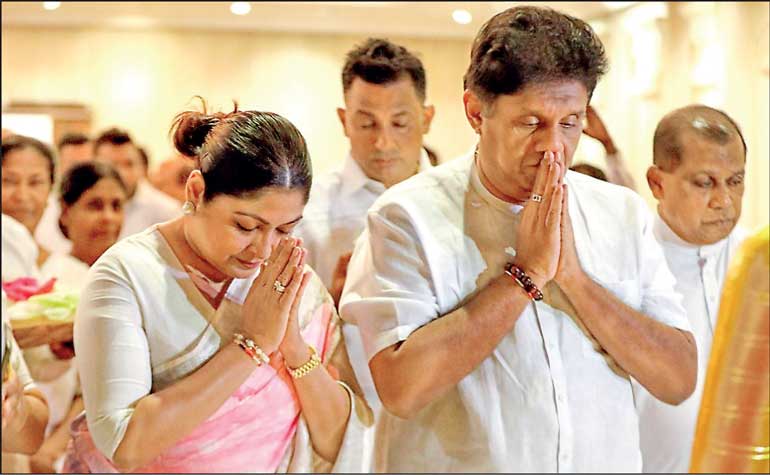
Never underestimate Sajith

The 52% are NPP-oriented
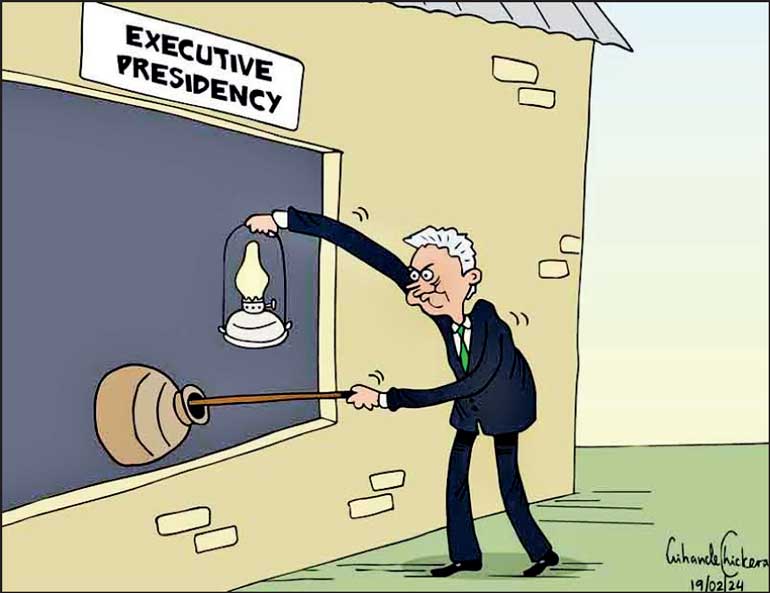
Election demolition by abolition
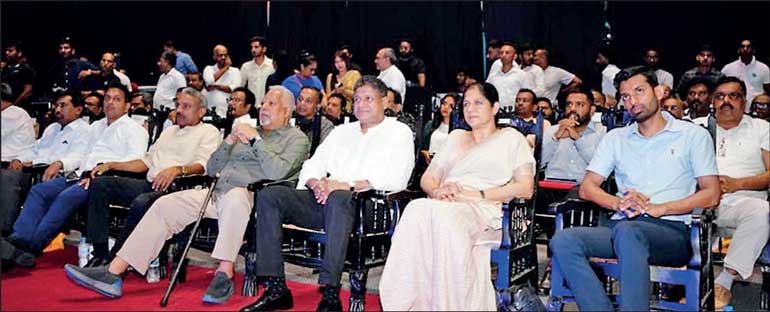
Rise of the New Right
 “Ranil will have to go home even before his term of office, if he attempts to evade the Presidential election.”
“Ranil will have to go home even before his term of office, if he attempts to evade the Presidential election.”
– Anura Dissanayaka, Women’s Convention, Kurunegala, 17 May 2024
The interim report of the Presidential Commission headed by former Chief Justice Priyasath Dep, appointed to suggest electoral reforms, will be presented to President Wickremesinghe in April. This gives cause for apprehension on several counts.
 As a president who was appointed and not elected, and was not even elected to the legislature in the first place, Ranil has no mandate to examine, still less attempt wide-ranging arrangements which would require a change in or of the Constitution. His task is to complete his predecessor’s term on the basis of his mandate and that mandate was the opposite of one committed to abolishing the executive presidency.
As a president who was appointed and not elected, and was not even elected to the legislature in the first place, Ranil has no mandate to examine, still less attempt wide-ranging arrangements which would require a change in or of the Constitution. His task is to complete his predecessor’s term on the basis of his mandate and that mandate was the opposite of one committed to abolishing the executive presidency.
 The SLPP has no mandate to support him in doing so, because it was elected on the contrary mandate.
The SLPP has no mandate to support him in doing so, because it was elected on the contrary mandate.
 By introducing electoral reforms (2015) which snarl up the existing electoral system, Ranil Wickremesinghe has put into suspended animation, the system of elected Provincial Councils. Constitutional and electoral reform could be similarly deployed to derail Presidential and parliamentary elections.
By introducing electoral reforms (2015) which snarl up the existing electoral system, Ranil Wickremesinghe has put into suspended animation, the system of elected Provincial Councils. Constitutional and electoral reform could be similarly deployed to derail Presidential and parliamentary elections.
 It is well within character. Asked by the media whether or not he supported the abolition of the executive presidency, former president Mahinda Rajapaksa replied with cynical humour “yes, why not, I’ve already been there, done that”. When posed a follow-up question “will this be used to postpone or cancel the presidential election?”, MR paused to say significantly: “yes, it may well be so…after all, you know Ranil…!”
It is well within character. Asked by the media whether or not he supported the abolition of the executive presidency, former president Mahinda Rajapaksa replied with cynical humour “yes, why not, I’ve already been there, done that”. When posed a follow-up question “will this be used to postpone or cancel the presidential election?”, MR paused to say significantly: “yes, it may well be so…after all, you know Ranil…!”
Abolition absurdities
Liberal-legalists urge the holding of a referendum on the abolition of the executive presidency at the same time as the earliest election this year. The logic is impressive: hold a referendum on the abolition of the country’s most important post, together with the election to pick someone for that very post.
No less rational is the suggestion to abolish the executive presidency and restore parliamentary sovereignty, i.e., transfer power to the very parliament that is, according to all opinion polls, the most reviled institution bar none, in the eyes of the citizens.
The process of abolishing the executive presidency will have to be endorsed by the currently sitting parliament, which has earned the animus and contempt of the citizenry. Any such endorsement will lack legitimacy.
Israel’s genocidal war illustrates the consequences of small extremist parties as driver of governments and veto-wielders over policy in a parliamentary system. Why restore a model in which Sinhala and Tamil ultranationalist parties can obstruct or dictate policy outcomes and national direction?
The disenfranchisement of the hill-country Tamils; Sinhala Only; media-wise and district-wise standardisation of marks; state takeover of schools; state takeover of the press; and enshrinement the hegemony of Sinhala and Buddhism in the Constitution—all these landmarks of discrimination were under the Westminster model. Why return to it?
The Presidency should be restructured to align with the American and French systems. Abolition is geopolitically dangerous, beginning with domestic geopolitics. The semi-autonomous Provincial Council system was introduced as a sub-system within the executive Presidential system (1978), not the Westminster model. Given the resurgence of Tamil ultranationalism in the political mainstream and the osmosis effect of enhanced connectivity with neighbouring South India, a parliamentary system cannot manage the semi-autonomous Provincial Councils.
These problems will surge to the forefront at any Referendum and boost the Sinhala revivalist ex-Gotabaya element (Dilith Jayaweera-Anuradha Yahampath, Wimal Weerawansa, Gevindu Cumaratunga).
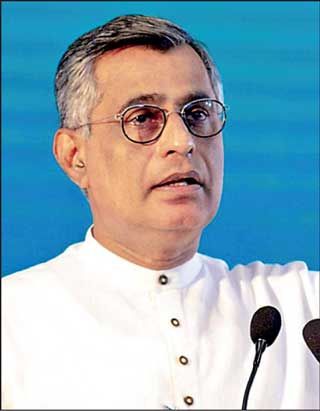 |
| Good program, bad prospects |
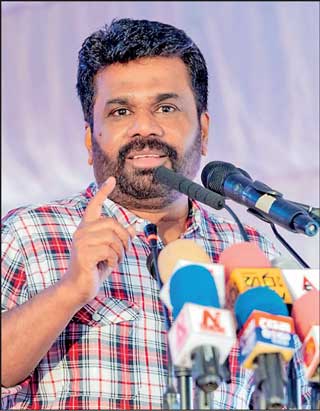 |
| Frontrunner in fine form |
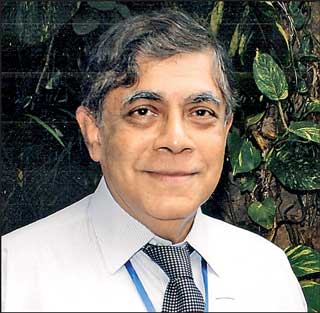 |
| Instant abolition advocate, Nihal Jayawickrama
|
Decapitating the presidency de-centres and debilitates the state in the face of centrifugal challenges. The Sinhala majority’s default option will be the island’s most trusted, popular institution according to opinion polls: the military.
The anti-racist civilian political parties, the JVP-NPP and SJB must be strongly commended for their War Veterans’ fronts, without which that massive social force would (re)turn to the ultranationalist Right. Reconciliation, accountability and sustainable peace are achievable only by incorporating and politically enlightening the war veterans collectively, and not by ignoring or marginalising them.
Nihal Jayawickrama’s nihilism
In an article in the Sunday press entitled ‘Abolishing the Executive Presidency--Is Time Running Out?’, Dr. Nihal Jayawickrama has provided a detailed constitutional roadmap for the abolition of the executive presidency and the transformation of the electoral system in a manner that would initiate an endlessly protracted process of new delimitation (re-zoning) of the country’s electoral map.
He insists surreally that this “is the real need of the hour” and should be done now, before the presidential election scheduled for Sept-Oct.
“The President and Vice-Presidents shall be elected by Parliament…A Bill for the above purposes will require to be passed with a two-thirds majority. The Constitution does not require such a Bill to be approved at a referendum…
The first step should be to reform the electoral system…… the delimitation of electorates will need to commence immediately.
…A new Constitution to replace the…1978 Constitution, is the real need of the hour… It will need a general election before it becomes fully operative, but it will not require a referendum to bring it into force…
…there is no reason why a new Constitution for Sri Lanka cannot be drafted and adopted by Parliament before the Elections Commission begins the process of electing a new Executive President.”
After the intentional paralysis of the Provincial Council and Pradeshiya Sabha elections by Ranil, why would anyone risk furnishing such an excuse and opportunity by urging Constitutional and electoral reform prior to the election of a new, legitimate President, Parliament and Provincial Councils? To borrow from Jean-Paul Sartre, such attempts manifest ‘bad faith’.
Dr. Nihal Jayawickrama’s suggestion is appallingly nihilistic. In 1982, the JVP contested the presidency, lost, but was looking forward to the parliamentary election of 1983. That chance was snatched away from it by the Referendum of December 1982, and the consequence was civil war. In 2024, the JVP-NPP has grown into the biggest, most dynamic Left movement I can recall in Sri Lanka. It has great momentum and is poised to run for the presidency which affords it the chance of leading the country. It is one thing if it is pipped to the post by a competitor, but quite another if the chance of national leadership is snatched away by Constitutional chicanery at the hands of an unelected President and a delegitimised Parliamentary majority, as urged by Jayawickrama.
That would be suicidal for the democratic political order plus market economy ‘ensemble’—the System-- because Anura Dissanayake will be unable to keep the lid on, even if he is inclined to do so.
Anura-Sajith-Champika
Sri Lanka has the leadership talent and the policy perspectives which would provide us with a fresh start and a better future, beginning this year with the scheduled presidential election. This was manifest in three public events/ performances last week by three national political personalities. These were:
 Anura Kumara Dissanayake’s two-hour long interview—exhaustive but by no mean exhausting-- on a popular TV channel. The interview dealt primarily though not exclusively with his visit to India, its implications and ramifications.
Anura Kumara Dissanayake’s two-hour long interview—exhaustive but by no mean exhausting-- on a popular TV channel. The interview dealt primarily though not exclusively with his visit to India, its implications and ramifications.
 Sajith Premadasa’s 100th Sakvala school programme.
Sajith Premadasa’s 100th Sakvala school programme.
 Patali Champika Ranawaka’s launch of his policy manifesto.
Patali Champika Ranawaka’s launch of his policy manifesto.
Anura
Anura Kumara Dissanayake aced the marathon TV interview, except for two points, which turned a possible ‘A+’ into an ‘A’ (I lapse occasionally into my old university academic habits), but more of that later. (https://www.youtube.com/watch?v=NNrp1BzwkGY&t=2s)
AKD was dressed and groomed perfectly, and looked very much like the (much younger) Chilean President Gabriel Boric, without the latter’s tattoos. His responses throughout the interview left me with the clear impression that he is indubitably qualified to run for President, and to serve as leader of the country-- though that eminent eligibility is no guarantee that he is will be elected to the post.
Because presidential debates have not yet been held, one cannot definitively conclude at this point that he is the best choice for the post, but Anura Kumara Dissanayake is indubitably presidential material, more than sufficiently suitable for the post, and quite right to seek to lead Sri Lanka. We citizens are lucky he is an option.
Scornful SJB dismissal of Anura as a demagogue with no concrete constructive achievement, is patently ridiculous. He has demonstrated excellent practical leadership and good decision-making in building the JVP-NPP at a cracking growth-rate from 3% and 3 seats to its manifest present strength and prestigious external status. The NPP has initiated a women’s revolution in politics.
The dysfunctionality of all other parties is a bad blurb for the country’s future prospects on their watch.
AKD handled the questions about India with superb skill, demonstrating the capacity for dialectically combining change and continuity; articulating a supremely realist approach to the present and future, the evolution of the JVP, the world and India, with a steely defence of militant patriotic resistance to a foreign military incursion and presence in the 1980s. The youthful leader demonstrated a cool, calm head, with just enough of a flash of fire in the belly to convince viewers that the national interest would be safe in his hands; that there were certain broad parameters he would not transgress and would resist transgression of.
He didn’t have the economic policy details that some others have but he had something they do not: a persuasive economic vision of recovery and development for Sri Lanka which amounts to a modernizing national renaissance. Of the present political leaders, Anura Dissanayake is the only one who has an inspiring vision for and of the economy. The others may have an economic vision, but do those inspire the citizenry, the people—or only the business and upper managerial elites?
Answering a question about his economic team—the interviewer said nobody quite knows its composition—Anura showed testiness and gave an inadequate answer. He named two members, Prof Anil Jayantha and Prof. Sita, whose surname he didn’t provide or I missed. He said sardonically they don’t seem to widely known because they aren’t parliamentarians, adding that Mahindananda is known but Prof Anil Jayantha is not because the former is an MP but the latter isn’t. That’s wrong. Nishan de Mel, Mahim Mendis and Nirmal Ranjith Devasiri are quite well-known, but they aren’t MPs.
However, I am confident that if the NPP team sits across the table from the IMF and/or the ISB holders, it will really represent and bargain hard for Sri Lanka, while the reflex of the present SJB economic team will be to “bend obligingly” (Mervyn de Silva’s description of UNP policy towards the West) before the IMF and foreign private creditors.
Sajith
Sajith Premadasa’s ‘Sakvala’ program which clocked a century last week gives credible evidence that if elected, his will be ‘a Presidency of service’ as it were; intervening to bring tangible improvements which are both catalyst and multiplier. Manique Mendis puts it best:
‘…The Suhuru classrooms are designed to empower children from underprivileged homes with modern education.
The Suhuru classroom equips schools with smart boards and ICT equipment such as computers and printers… The school is also given a set of dictionaries to encourage the students to enhance their level of English.
…The results of the Sakwala program demonstrate that whilst being in the Opposition, Sajith Premadasa is opening doors to opportunity in the lives of children in Sri Lanka.’
(Vistas of opportunity for Sri Lankan children with “Suhuru” classrooms | Daily FT)
‘…In schools in Sri Lanka where the majority of students came from low-income families, parents…cannot afford the luxury of meeting the high costs of transport for children to take part in extra-curricular activities, competitions, educational excursions and special events in locations far away from the school premises…The children thus lack the opportunities to maximise their potential to shine.
…A magnificent new bus…is a transformational opportunity for the children, parents and teachers. [This] came through the Sakwala program of Opposition Leader Sajith Premadasa…’ (New opportunities, transforming children from low-income families | Daily FT)
Sajith’s pitch is a practical progressivism of incremental, constructive, cumulative and sustainable change. His combination of an elite Western education and concerned social intervention makes him a decidedly viable Presidential contender.
Champika
Though nowhere as conceptually strong as the Communist Party’s ‘Beyond the Way Forward’ (‘Idirimagen Idiriyata’) Champika Ranawaka’s ‘A Step Forward With Unity For Our Nation’ is a far better policy perspective than the Economic Blueprint of Dr. Harsha de Silva and the SJB Economic Council.
SJB economists are quite confused. They approvingly cite President Premadasa’s 200 garment factories program while advocating that Sri Lanka specialise in services and as a financial hub—though Premadasa’s program was the very acme of a production/manufacturing orientation; of export-oriented industrialisation.
Champika’s document however, is sensible, lucid, pragmatic and centrist; born of experience, it is nationally-grounded and workable, not polarising and de-stabilising.
Had Sajith Premadasa managed to retain Champika and worked with him on an economic program, he would have had a much better chance than he does now of beating AKD and the JVP-NPP. Sajith could have assembled a crackerjack troika of policy advisor-politicians: Prof Charitha Herath, Champika Ranawaka and Dr. Nalaka Godahewa.
Champika worked closely with Sajith during the presidential campaign of November 2019 and was willing to play de facto deputy. What he was understandably unwilling to do was to play second fiddle when the SJB’s most influential circle began to resemble the Royal-Thomian Mustangs tent, populated by personalities half as smart and politically experienced as himself. He went solo.
Had he emulated JR and Premadasa and wrested the No. 2 spot, he’d have helped Sajith win in 2024, been PM, and Sajith’s successor after one term. Ranil may offer him that slot, but Champika can’t save Ranil, the last of the Old Guard.
Ranawaka has modelled himself as a Modi-wannabe, forgetting that Modi was a figure in an established mass party, the BJP. Champika never really made it beyond ‘sect’ or ‘cult’ scale. He would make a good developmental Prime Minister but is probably too late, because the ‘Women’s Wave’ may propel Dr. Harini Amarasuriya appropriately to that post.
Champika’s decisively wrong turning came in the aftermath of the vanquishing of the JVP by Premadasa. A former leader of the Inter-University Student Federation, he was writing (anonymously) in 1991 a brilliant, penetrating critical history of the JVP’s second rebellion and defeat, in the Lakmina, a lively leftwing tabloid edited by Sunil Madhava Prematilaka with Dullas Alahapperuma as News Editor. Champika’s evolving essay could have been a re-founding text for the JVP. Instead, he aborted the enterprise, rejected any and every Left worldview and paradigm, and converted to Sinhala-Buddhist ultranationalism (with an environmentalist twist) under the influence of Gunadasa Amarasekara and Prof. Nalin de Silva.
If not for his irredeemable ideological renegacy and regression to a radical-rightist ‘Sinhala Zionism’, Champika Ranawaka rather than Anura Dissanayaka may have been leading the JVP-NPP or some version of it, knocking at the door of the presidency.
Nalin de Silva was and is Dilith Jayaweera’s declared guru. Any proud acolyte and proselytizer of Nalin’s weird nativist, ethnoreligious supremacist ‘Jathika Chinthanaya’ is no choice for the presidency.